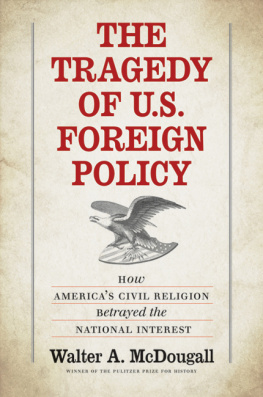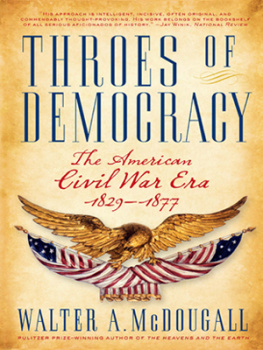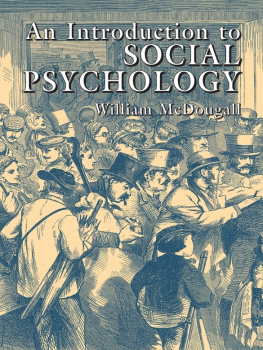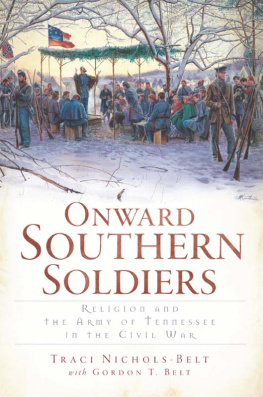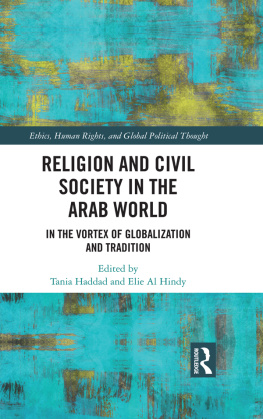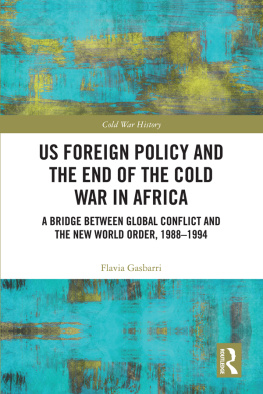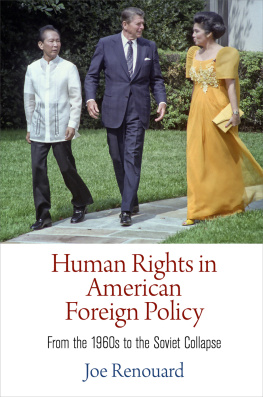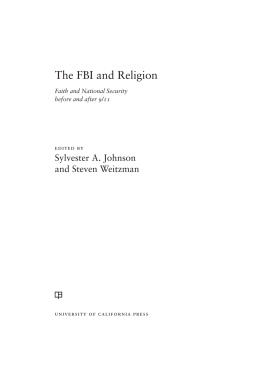THE TRAGEDY OF
U.S. FOREIGN POLICY

Published with assistance from the foundation established in memory of Calvin Chapin of the Class of 1788, Yale College.
Copyright 2016 by Walter A. McDougall.
All rights reserved.
This book may not be reproduced, in whole or in part, including illustrations, in any form (beyond that copying permitted by Sections 107 and 108 of the U.S. Copyright Law and except by reviewers for the public press), without written permission from the publishers.
Yale University Press books may be purchased in quantity for educational, business, or promotional use. For information, please e-mail (U.K. office).
Set in Janson type by IDS Infotech Ltd.
Printed in the United States of America.
ISBN: 978-0-300-21145-0 (hardcover : alk. paper)
Library of Congress Control Number: 2016939152
A catalogue record for this book is available from the British Library.
This paper meets the requirements of ANSI/NISO Z39.48-1992 (Permanence of Paper).
10 9 8 7 6 5 4 3 2 1
To all who have prayed for me
and to the Spirit that moved them
A nation ought to know itself. It ought to form a just estimate of its own situation, both with respect to itself and to its neighbors. It ought to learn the excellencies, and the blemishes likewise of its own constitution. Without a discriminating sagacity of this kind, the principles of imitation, intended for the wisest purposes in states as well as in individuals, would be always an uncertain, sometimes a dangerous guide. A measure extremely salutary to one state, might be extremely injurious to another. What, in one situation, would be productive of peace and happiness, might, in another, be the unfortunate cause of infelicity and war. This duty of self-knowledge is of vast extent and of vast importance, in nations as well as in men.
T HE W ORKS OF THE H ONOURABLE J AMES W ILSON , 1804
A half-century ago [1901] people in this country had a sense of security vis--vis their world environment such as I suppose no people had ever since the days of the Roman Empire. Today that pattern is almost reversed. What has caused this metamorphosis? How did a country so secure become so insecure?
GEORGE F. KENNAN , A MERICAN D IPLOMACY , 1951
Everything begins in mysticism and ends in politics. Politics laughs at mysticism; nevertheless it is still mysticism which feeds these same politics.
CHARLES PGUY , N OTRE J EUNESSE , 1910
Contents
Introduction: 9/11 in Parallax Vision
Four political cartoons framed the whole sorry story. The first served as cover art for the final 2001 issue of The American Spectator. It reproduced a Victorian lithograph of fierce Afghan warriors firing muskets from a rocky redoubt. The added caption, however, was entirely up to date. Theyve got Avanex Powermuxes! shouts one tribesman. Were toast, his comrade replies. As that issue went to press, Operation Enduring Freedom, the post-9/11 assault on Al Qaeda and the Taliban, had barely begun. Yet the cover story by Victor Davis Hanson, Why the West Has Won and Will, anticipated the swift campaign that apotheosized the high-tech new American way of war, which in turn persuaded the administration of George W. Bush that an Iraqi invasion would be equally antiseptic. That righteous confidence was captured in a second cartoon on the cover of the February 18, 2002, issue of Der Spiegel. Above the title, Die Bush Krieger: Amerikas Feldzug gegen das Bse (The Bush warriors: Americas campaign against evil), the artist caricatured the architects of the Global War on Terror as superheroes. Secretary of State Colin Powell was Batman; Secretary of Defense Donald Rumsfeld, Conan the Barbarian; President George W. Bush, Rambo; Vice President Richard Cheney, the Terminator; and National Security Adviser Condoleezza Rice, Xena the Warrior Princess.
Operation Iraqi Freedom in spring 2003 seemed to unfold according to script. But soon both blitzkriegs degenerated into protracted occupations whose costs in blood, money, and prestige mocked the boasts of American benevolent hegemony. Hence a third cartoon on Der Spiegels cover of October 27, 2008, displayed Die Bush Krieger: Ende der Vorstellung (End of the performance). Powell is long gone, his Batman suit discarded. A wounded Rumsfeld limps offstage. Bush is exhausted, his bandolier now a sling for his arm. Cheney and Rice are stunned and bedraggled. The shows over.
Only it wasnt. To be sure, Barack Obama seemed and sounded like Bushs opposite to the degree American politics will permit. But presidential transitions are always blurrier than remembered or depicted in textbooks, and in any case the conflict with Islamic terrorism appears indeed to be generational. So Obama confounded his friends (including the Nobel Peace Prize committee) by continuing to wage the Global War on Terror, albeit on a limited-liability basis, and did not repeal the Bush Doctrine. Accordingly, a fourth withering cartoon, this one sketched by the Philadelphia Inquirers Tony Auth, appeared on August 1, 2010. It depicted a dilapidated, garbage-strewn urban neighborhood devoid of people. In the foreground a federal building displayed the American flag, but it, too, was decrepit and empty. A sign on the wall explained why: gone nation-building.
In 1997 a certain Cassandra published Promised Land, Crusader State: The American Encounter with the World since1776, which questioned the conventional lexicon of U.S. diplomatic history and warned against imperial overstretch in pursuit of utopian goals. Walter Russell Mead, whose own erudite histories have explored the cultural roots of American foreign policy, later credited the book for having challenged two generations of received historical wisdom and changing the way the history of American foreign policy is taught. That certainly seemed the case given the subsequent spate of titles containing such phrases as Messianic Nation, Redeemer Nation, Crusader Nation, and Meads own Special Providence. What is more, the themes and issues raised by that 1997 book have only grown in immediacy. Suffice to say the book was translated into Arabic.
Promised Land, Crusader State defined eight traditions in foreign affairs inspired by two centuries of U.S. engagement with the world. A first set of four traditionsthose born of the image of the United States as a Promised Landconstituted a sort of Old Testament that informed U.S. foreign relations from George Washingtons Farewell Address (1796) to the end of Grover Clevelands second term (1896). Those nineteenth-century traditions included (1) Liberty, or Exceptionalism (so-called), which sanctified unity, sovereignty, and freedom at home as the highest purpose of statecraft while shunning aggressive export of American ideology; (2) Unilateralism or Isolationism (so-called), which sanctified peace, friendship, and commerce with all nations but entangling alliances with none; (3) the American System, or Monroe Doctrine (so-called), which declared the New and Old Worlds to be separate spheres; and (4) Expansionism, or Manifest Destiny (so-called), which blessed territorial growth in North America but only commercial and cultural outreach overseas.
A second set of four traditionsthose born of the image of the United States as a Crusader Stateconstituted a sort of New Testament that informed U.S. foreign relations from William McKinleys inauguration (1897) to the end of Bill Clintons first term (1997). Those twentieth-century traditions included (5) Progressive Imperialism, through which Americans embraced navalism, overseas empire, and Open Door economics; (6) Wilsonianism, or Liberal Internationalism (so-called), under whose banner Americans waged two world wars for new world orders; (7) Containment of communism throughout the Cold War; and (8) Global Meliorism, the conflation of American policies designed to assist other countries (especially Third World ones) through foreign aid, humanitarian intervention, nation-building, and democracy promotion.
Next page
